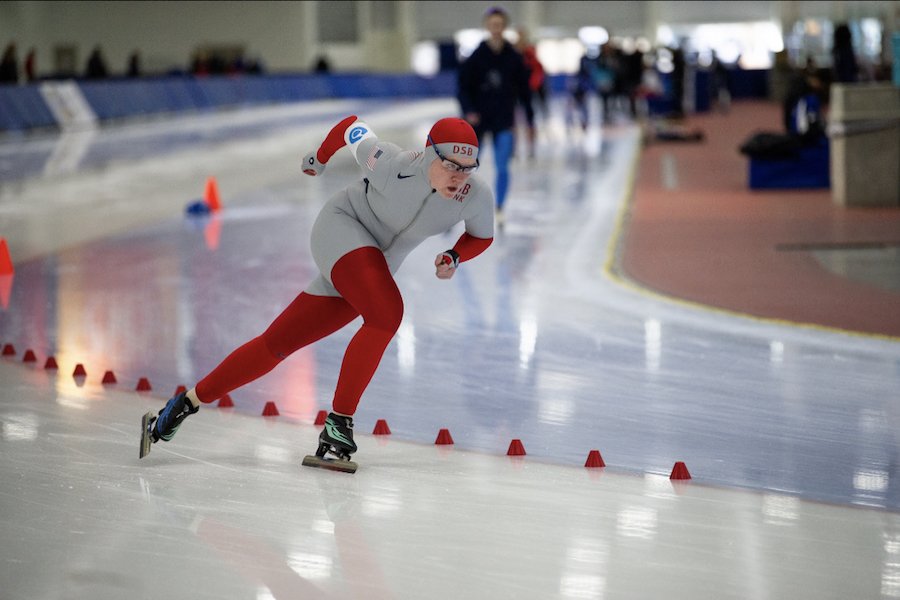Ilsa Shobe: Future doctor, Olympic hopeful, CSE student

Top: Shobe catches up on homework in between skating practice at the rink in Salt Lake City.
Photo credits: Ilsa Shobe
Student aims to help the U.S. skate faster in upcoming Olympics
December 10, 2021
Imagine taking your first steps as a toddler—in ice skates. Maybe it wasn’t quite that early, but for University of Minnesota College of Science and Engineering student and amateur speedskater Ilsa Shobe, it was pretty close.
“I've done it since I could walk. The first picture of me in speed skates, I think I’m two years old, maybe not even,” Shobe recalled.
“My grandpa was a speedskater, and he was in three Olympics. My mom, my grandpa’s siblings, and my mom's cousins all skated. Our whole family did. I started and I just loved it, so I kept going.”
Shobe is a senior majoring in biomedical engineering—inspired by her mother, who also attended CSE and graduated with a master's in biomedical engineering. This year, she’s working with CSE Professor Art Erdman and sports scientists from the official U.S. Speedskating team to research the physics behind the sport, with the ultimate goal to help the athletes skate faster and more efficiently. And, she’s doing it all remotely from Salt Lake City, Utah, where she too is training anywhere from 24-40 hours per week to be an Olympic speed skater.
She tried out for the 2022 Winter Olympics at the trials in February 2022, but her real goal is to compete in the 2026 games. In March, Shobe and her woman's pursuit team
were awarded a bronze medal at the International University Sports Federation (FISU) World University Speed Skating Championships in Lake Placid, New York.
Shobe, who grew up in St. Cloud, Minn., moved out west last summer during the height of the COVID-19 pandemic.
“I was to the point where I needed to be skating with people who are faster than me so that they would be pushing me to skate faster,” Shobe explained. “In Minnesota, the oval is outside and we don’t get ice until November, so I miss out on the first half of the season. In Utah, it's indoors, so it’s a much more controlled climate.”
Because of the University’s newfound capacity for remote learning, Shobe was able to continue her studies in CSE. She works a tight schedule—planning her classes around training, watching lectures between workouts, and finding time to do research.
Her project with U.S. Speedskating focuses on measuring the forces that the skaters exert on the ice and figuring how strong they need to be in order to execute different techniques.
Right now, Shobe is sorting through data gathered from Dartfish, a computer program that can track the speed and biomechanics of skaters on the ice. Then, she’ll do calculations with their body weights to figure out what forces they need to be exerting in order to perform most efficiently. Her findings will likely be used by real athletes in the upcoming 2022 Winter Olympics.
“Since this season's an Olympic season, U.S. Speedskating is trying to figure out how strong everyone needs to be to be successful at the Olympics and what needs to be improved upon before then,” Shobe said.
“I think it's super interesting that my research is going to be used as I’m doing it. It's not something that they won’t use until five years from now. I could actually affect how we do at the Olympics, and that's very exciting.”
After she’s done skating at an elite level, Shobe plans to leverage her engineering talents and experience with academic research in medical school.
“The University of Minnesota’s biomedical engineering department is really one of the best in the nation,” she said. “With research, you learn a lot as you go. It’s really important to be able to learn on the fly and know how to fix things when they go wrong. I think that’s really great for any future career, whether it's in biomedical engineering or in medicine.”
To learn more about what it’s like to train as a speedskater, read a Q&A with Shobe on the Department of Biomedical Engineering website.
Story by Olivia Hultgren
If you’d like to support students in the University of Minnesota College of Science and Engineering, visit our CSE Giving website.
